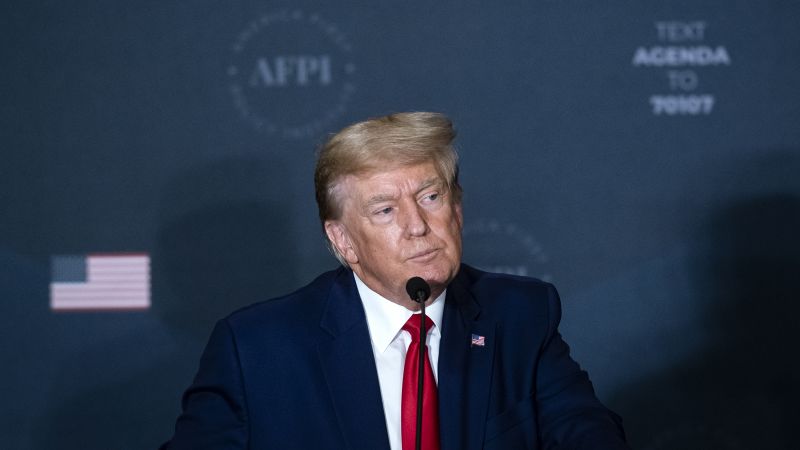

CNN
—
Donald Trump is the first former president to be indicted. Given that move by a New York grand jury and the other high-profile criminal cases involving Trump, you might think his political fortunes are endangered.
But many Republican officials seem hesitant to attack the former president (instead turning on Manhattan District Attorney Alvin Bragg, who brought the charges), and betting markets still favor Trump for the GOP nomination in 2024.
So what’s going on? We’re in an obviously unprecedented situation, and the political reality can change post-indictment.
Still, Republicans and bettors are likely reacting to three facts:
- Trump’s polling lead in the 2024 Republican primary has grown over the last month as an indictment loomed.
- Most Republicans think all the different Trump probes are motivated by politics.
- A majority of Trump supporters aren’t overly concerned about his electability among general election voters.
Recent polls from Fox News, Monmouth University and Quinnipiac University have shown how Trump’s Republican primary prospects have improved. All had Trump leading by double digits in March, with his advantage over his nearest rival – Florida Gov. Ron DeSantis, an undeclared 2024 candidate – growing by 12 points since February.
According to the Quinnipiac poll, which was published this past week, just 18% of registered Republican voters thought the accusations against Trump in the alleged hush money scheme in New York were very or somewhat serious. A majority (53%) believed they were not serious at all.
The fact that the indictment is now a real (not just potential) occurrence could change some opinions, though perhaps not as many as you might think.
Most Republicans (and, in fact, a majority of all voters) in the same Quinnipiac poll didn’t believe the man bringing those charges (Bragg) was an unbiased observer. Nearly every Republican (93%) thought his case was mainly motivated by politics. Most voters (63%) thought the same thing.
Indeed, when it comes to any indictment, Republicans seem to have adopted a viewpoint favorable to Trump. A Marist College poll published this past week asked respondents which view of all the different Trump investigations came closer to their own: that they were fair or that they were a “witch hunt.”
While 55% of all voters said they were fair, just 18% of Republicans and 14% of 2020 Trump voters believed that they were. Most Republicans (80%) and 2020 Trump voters (84%) told Marist that the investigations were a “witch hunt.”
The polling results are consistent with what we know about how Republicans feel about the underlying information at the center of the different probes.
Beyond the New York case, surveys also show that a majority of Republicans believe that Trump did not commit a crime in his efforts to overturn the 2020 election result. Likewise, polling indicates that most Republicans believe Trump was righteous in those efforts, with a majority continuing to believe the falsehood that Joe Biden only won the election because of voter fraud.
Of course, the fact that Republicans believe these cases are politically motivated is only part of what is at play here.
The other component is how Republicans view Trump in the context of the broader general electorate. Conceivably, Republicans might think Trump is innocent, while also believing that his legal issues could harm him in the general election. After all, most voters think the investigations are fair.
But surveys show that for Republican voters, agreement on the issues is more important than electability when it comes to making their primary choices. In our most recent CNN/SSRS poll, Republicans and Republican-leaning independents indicated, by a 59% to 41% majority, that beating Biden was a higher priority than agreement on the issues.
Trump’s supporters were no different. Sixty-one percent said issue agreement tops electability, while 39% of them disagreed.
This is a massive difference from what occurred in the 2020 Democratic primary. By March 2020, 73% of Biden backers were telling pollsters that electability was more important than issue agreement.
Put another way, Biden’s case to Democratic voters relied on electability in a way that Trump’s case to Republicans does not.
This may be why Trump still leads, despite a majority of Republicans already believing that their best chance to beat Biden lies with other potential nominees. According to a Marist poll from February, 54% of Republicans thought someone other than Trump would give the party the best chance of taking back the White House in 2024.
Of course, Republican voters may not necessarily be wrong in their calculations this year. Even with all the potential electability problems, Trump has been ahead of Biden in more general election polls in the early part of the 2024 cycle than he was over the entirety of the 2020 cycle. The same polling shows that DeSantis tends to do a few points better against Biden than Trump does, which matches up with what a majority of Republicans think.
The big question going forward is what happens now that Trump has been indicted? Will Republicans continue to stick with him? Will electability matter more if Trump’s poll numbers weaken considerably against Biden?
We don’t know the answers, but what we can say is the current political environment is one that is not harming Trump in the GOP primary.